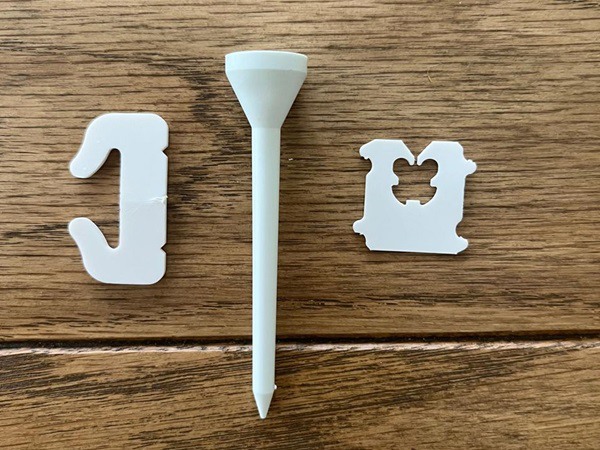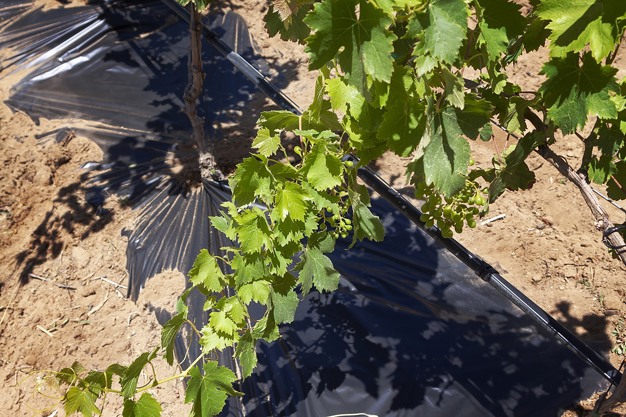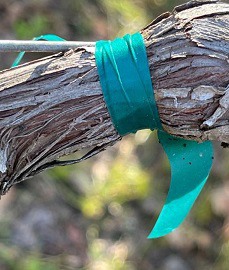South Africa is perfectly placed to capture the market for alternatives to the vast amount of plastics used in farming, the millions of clips, acres of sheeting and many miles of twine and rope, believes Andrew Pollock, entrepreneur and founder of The Compostable Company.
In 2019 The Compostable Company imported various Italian bioplastic plantbased resins from the Mater-Bi range created by Novamont, an Italian bioplastics company holding over a thousand patents. They imported 'soft' resins to manufacture agritape and 'hard' resins for what was the world's first biodegradable agriclip to tie up vegetable plants, branchlets and grape vines. The compostable clips, mulch film and agritape were used on wine farm Alexanderfontein in the Darling district for five years and the farm now has, he remarks, plastic-free vineyards.
The latest addition to The Compostable Company's offering, Pollock says, is an agritwine created by SICOR and Novamont Bayer in Portugal, which will now be trialled in South Africa and Zimbabwe.
Cape Town-based Mouldex manufactured the first compostable agriclips (left) and the golf tee (middle) for The Compostable Company.
Bioplastics under AGOA converges US-African interests
This is only the start of Pollock's ambitions for a compostable bioplastics manufacturing sector based in Southern Africa, made possible by the African Growth and Opportunity Act (AGOA), initiated by the Clinton administration. He points out that AGOA gives African manufacturers preferential access to the US market, conferring on them an incalculable advantage: African companies can land their products at a cost advantage that no other First World country has in the United States.
California's Office of Environmental Farming & Innovation (OEFI) agrees with him that reduced plastic use in agriculture would result in a net benefit for the environment, and come the second extension of the African Growth and Opportunity Act beyond November 2025, he will invite a delegation of plastic converters to showcase their South African-made products to the OEFI in California. They will make the case for a bioplastics manufacturing hub situated in the Western Cape supplying the US with all the biodegradable mulch, clips, tape and twine they require.
Moreover, there is an agreement between the California Food and Agriculture Directorate and the Western Cape department of agriculture in place, layered on top of the AGOA agreement.
"If you look at the very big picture: China is not a favoured trading partner of the USA any longer yet most plastic going into the USA, comes from China. We want to pitch ourselves as the alternative supplier of a non-plastic that will biodegrade and compost over time."
South Africa's charge of genocide against Israel at the International Court of Justice upset a number of US senators and had placed doubt over South Africa's future inclusion among AGOA-favoured nations. However, Pollock has complete faith in the newly-formed government of national unity to successfully carry through South Africa's AGOA extension. He says it fully exemplifies the type of "win-win situation" that the United States wishes to see from the agreement.
From an agricultural point of view, he continues, this is a complete game-changer. "We've got the facilities here in the Western Cape and those factories [benefitting from AGOA] would have to upscale or subcontract, creating more opportunities downstream, and there are a lot of facilities not being used because of the state of our economy. You cannot believe how important AGOA is for South Africa."
Pollock has explained the concept of bioplastics to the new minister of agriculture John Steenhuisen, and he is heartened by Dr Dion George in whom, he says, the country has an excellent minister of Environment, Forestry and Fisheries. The Compostable Company's biodegradable agrimulch.
The Compostable Company's biodegradable agrimulch.
World Bank notes opportunities for carbon-competitive South African exports
But it doesn't only concern the United States. "More and more," Pollock notes, "South African exporters of fruit into Europe have to pay taxes on the plastic packaging that they send with their fruit."
The World Bank has noticed that, too, and at the start of the month released their report that climate change and related global agreements represented an enormous challenge for South Africa's policymakers. The report states that South Africa's exports of goods remain concentrated in products that are carbon intensive - and considerably more carbon intensive than those exported by the country's competitors. The World Bank report identifies the support of carbon-competitive exporters as a worthwhile endeavour, with concomitant "trading opportunities by taking advantage of the export potential in some environmental products."
The World Bank report identifies the support of carbon-competitive exporters as a worthwhile endeavour, with concomitant "trading opportunities by taking advantage of the export potential in some environmental products."
Right: compostable agritape from Mater-Bi bioplastic.
Meanwhile, a number of African countries like Kenya, Rwanda, the Democratic Republic of the Congo, Mauritius and Rodrigues have already banned single-use plastic bags, created huge opportunities for plastic converters to change to biodegradable raw materials, and the environmental and social benefits will be enormous.
Given the operating environment, exploring non-plastic alternatives has become imperative as exporters adapt to increasingly stringent European plastic legislation.
"I think this World Bank report is especially important for us because it states that products that are so-called green, are the ones we should be exporting and the American market is extremely attractive for us to do that, with the support of the Western Cape Premier Alan Winde," he says.
Remembering a world before plastic
For Pollock, it's personal. He remembers a world before plastic, but the turning point came when he found microplastic in his borehole water in the Cape Town suburb of Constantia, which led to his involvement with finding alternatives to the pollution caused by degraded plastic ground covers used in wine vineyards.
He's no golfer, he says, but the idea for a compostable golf tee made from the same Mater-Bi resin came to him naturally. The Compostable Company's brand-new prototype for a biodegradable golf tee has already generated interest from the golfing community in Saudi Arabia which would be, in his view, a massive statement on the importance of addressing the ubiquity of plastic. For more information:
For more information:
Andrew Pollock
The Compostable Company
Tel.: +27 82 491 0345
Email: [email protected]
https://www.thecompostableco.com/
